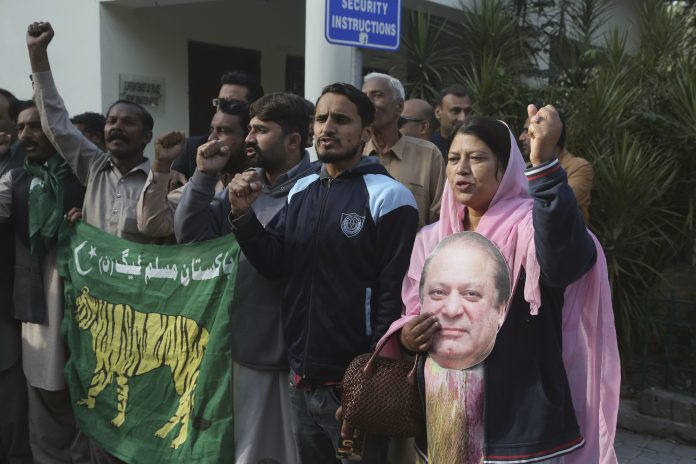
Pakistan’s ailing former Prime Minister Nawaz Sharif, who was convicted of corruption, left the country on Tuesday to travel to London for medical treatment.
The 69-year-old Sharif, who served three times as prime minister but fell from grace after the Supreme Court ousted him from office over corruption allegations two years ago, has had a history of health problems, including heart disease.
He departed on a specially equipped medical plane from the Pakistani city of Lahore, after a court granted him permission to leave for four weeks abroad for medical treatment. His conviction was earlier suspended for eight weeks on medical grounds.
Local television stations broadcast footage of Sharif being helped by one of his brothers and another man to board the plane, which was then shown in the air after takeoff.
Sharif’s younger brother Shahbaz Sharif, who is the head of Pakistan Muslim League opposition party, is accompanying him along with his physician Adnan Khan.
Nawaz Sharif has always maintained his innocence and denied the corruption charges that prompted the country’s top court to remove him from office in July 2017. He claims he has been politically victimized.
Elections that followed that year ushered in the government of Imran Khan, who has vowed to root out corruption.
Sharif was earlier this year sentenced to seven years in prison. After his health deteriorated last month, he was rushed from his prison cell to a hospital in Lahore where he later suffered a minor heart attack.
Khan on Monday dismissed all speculation about a political deal to allow Sharif to leave and reaffirmed his intention to fight corruption. He said Sharif’s brother had made a personal appeal and that he could not stand in the way of medical treatment for his ailing predecessor.
Sharif’s party has blamed Khan’s government for imposing a heavy bail bond on the former premier, a sum that was later overturned by the authorities, allowing Sharif to leave. His permit for four weeks abroad can be extended if he isn’t well enough to travel back.
During his tenure, Sharif had a bitter relationship with Pakistan’s powerful military establishment and did not complete any of his three five-year terms as prime minister.
He entered politics as a protege of dictator Gen. Zia ul-Haq, who seized power in a military coup in 1977 and appointed Sharif finance minister for the province of Punjab. Sharif’s first stint as prime minister, from 1990 to 1993, ended when then-President Ghulam Ishaq Khan dismissed him amid corruption allegations.
Sharif’s second stint as premier, which began in 1997, was cut short when he was toppled in a military coup in 1999 and sent into exile by Gen. Pervez Musharraf who grabbed power. Musharraf is currently living in exile in Dubai and a treason case is pending against him. The case was filed by Sharif when he was in power, angering the army.q



















